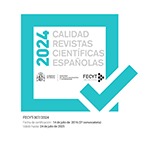Políticas de información: desarrollo y estrategias de los programas de la UE e impacto en España
Resumen
En este estudio se describen las políticas de información procedentes de la Unión Europea y su impacto en el diseño de las políticas de información españolas. Se advierte la escisión entre un modelo regido por la eficiencia y la calidad formulado en la Unión Europea y un contexto económico y social crítico en España desde el año 2010, especialmente en el séptimo Programa Marco vigente hasta el 2013. Por un lado, la Unión Europea ha favorecido el desarrollo de instrumentos específicos relativos a las políticas de información bajo la articulación de programas y proyectos transnacionales, bien como consorcios, Eureka y ESPRIT (European Strategic Programme for Research in Information Technologies), o los sucesivos programas periódicos conocidos como Programas Marco. Ello ha propiciado la creación de organismos e instituciones españolas, como REBIUN (Red de Bibliotecas Universitarias), FECYT (Fundación Española para la Ciencia y la Tecnología) o la Agencia Estatal de Investigación (AEI) de reciente creación (junio 2012). Por otro lado, el diseño de las políticas de información de la Unión Europea señala la aspiración de la Unión Europea a situarse geográfica, económica, tecnológica y estratégicamente frente a otras regiones de peso, como son América del Norte y Japón, como prueba la Agenda Digital 2010, primera iniciativa que ampara el objetivo estratégico Europe 2020.Descargas
Descarga artículo
Licencia
La Revista General de Información y Documentación, para fomentar el intercambio global del conocimiento, facilita el acceso sin restricciones a sus contenidos desde el momento de su publicación en la presente edición electrónica, y por eso es una revista de acceso abierto. Los originales publicados en esta revista son propiedad de la Universidad Complutense de Madrid y es obligatorio citar su procedencia en cualquier reproducción total o parcial. Todos los contenidos se distribuyen bajo una licencia de uso y distribución Creative Commons Reconocimiento 4.0 (CC BY 4.0). Esta circunstancia ha de hacerse constar expresamente de esta forma cuando sea necesario. Puede consultar la versión informativa y el texto legal de la licencia.











